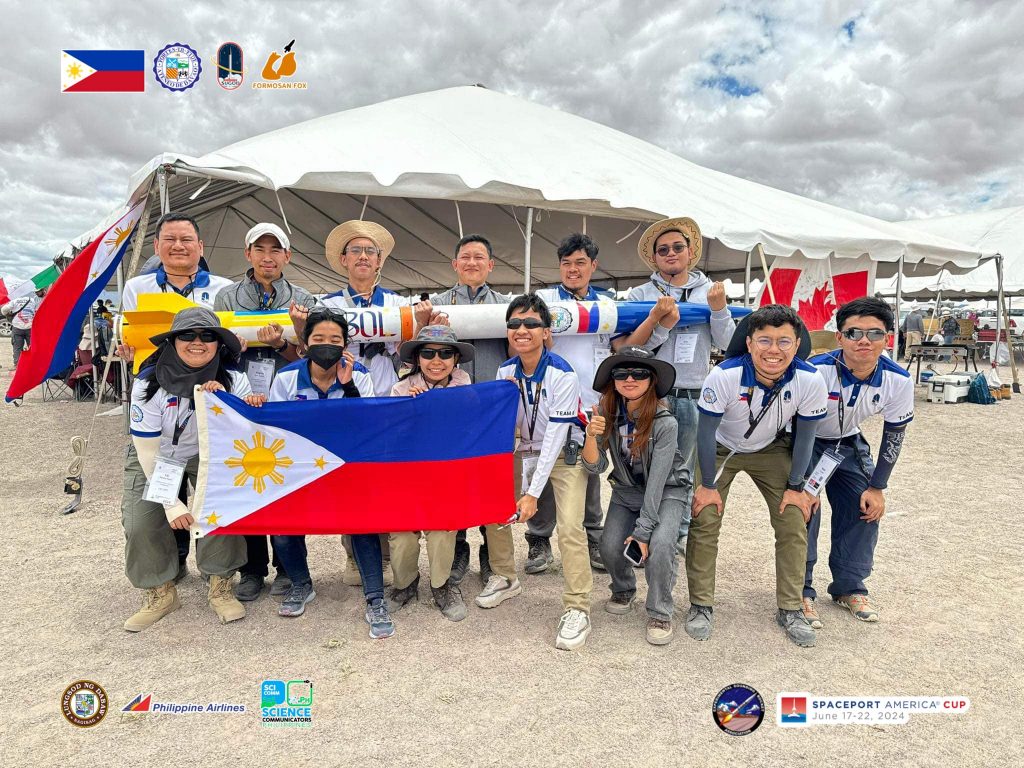BY KATRINA FAYE SANCHEZ/ADDU INTERN
ATENEO de Davao University’s (AdDU) rocketry team bared their optimism for the future of Philippine rocketry and the dilemmas they faced before the successful launch of rocket ‘Sibol’ at the Spaceport America Cup 2024.
‘Sibol’ was launched on June 21, US time, June 22 local time, at Spaceport America in New Mexico, USA, and was the last rocket launched that day.
The team defied all odds, made history, and exhibited the power of aerospace, teamwork, and resilience.
On stepping into the global arena, representation
The AdDU rocketry team is the first team from the Philippines to enter SAC, the largest intercollegiate engineering competition worldwide, competing alongside 152 teams from different countries across the globe.
Despite not winning, the team’s successful rocket launch is a momentous achievement in and of itself for the sprouting aerospace expeditions in the country.
“Just the fact that we were able to launch and deploy the rocket itself means that we’ve demonstrated not just to the country but also to the rest of the world that we are very much capable of rocket development,” AdDU aerospace engineering chairperson Rogel Mari D. Sese said.
Representation matters for structures member Dylan Mayled as she expressed the thrill and fulfillment she felt in representing the Philippines in the global rocketry arena during the Kapihan sa Dabaw held on July 1.
“We are the first Filipino team in that competition, so we have indeed planted our mark in that, and I think that it’s important for the growth in aerospace here in the Philippines, a starting point,” she said.
However, recovery lead substitute Mariz Cenojas felt overwhelmed when they arrived at the competition to see that other rockets were more advanced in comparison to theirs.
“Even some teams had special mechanisms such as air brakes which we didn’t have and we were kind of pressured about it,” she continued.
To add, team captain Franz Guevarra said, “Of course, kulbaan gyud mi, but, after the nerves was the relief that we were able to launch a rocket and after months of hard work, we were able to pull it off (Of course we were nervous, but after the nerves was the relief that we were able to launch a rocket and after months of hard work, we were able to pull it off).”
Nevertheless, the team said they mingled with other rocketry teams from Seattle, Texas, California, Canada, Taiwan, fellow SEA country Thailand, and many others.
“We’re glad na we’re able not only to gain friends but also to gain insights on how were they able to make the rockets so that we could also improve our processes here and do better the next time around,” structures member Avery Dimasuhid said.
Embodying mechanisms, execution, and vigor
Of the 16 AdDU rocketry members, only 10 students and 3 faculty members flew over to the USA to compete in the Commercially Off-The-Shelf (COTS) category, to develop a rocket capable of reaching 10,000 feet with an 8.8-pound payload.
During Wednesday’s media forum, team adviser Wilfredo Pardorla Jr. said after their rocket’s successful launch, the initial assessment from its fly-off record reflected repairable damages- an indication of its eligibility to fly again.
He added that the rocket’s post-analysis showed that only two shrouds of the parachute cord snapped, crediting shock forces and injection charge as some of its limiting factors.
“The simple explanation was some of the parachute shrouds snapped because of shock forces that’s why it didn’t work as expected but regardless of that we can assure you that we were able to recover the rocket very well and it was still intact when we recovered it,” Cenojas said.
The team also said they struggled with the time difference and got intimated by cultural differences.
“But at the same time, we also acknowledge that we’ve undergone the same process, especially in making our own individual rockets,” Dimasuhid said.
Lastly, the team dedicated their efforts and expressed gratitude to their family, friends, supporters, sponsors, and the AdDU community.
The AdDU rocketry team hopes to improve for and top future Spaceport America Cup competitions.
Image from ADDU Rocket Development Program FB page

